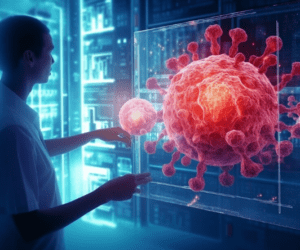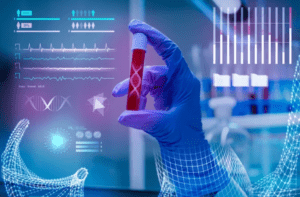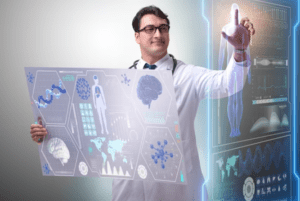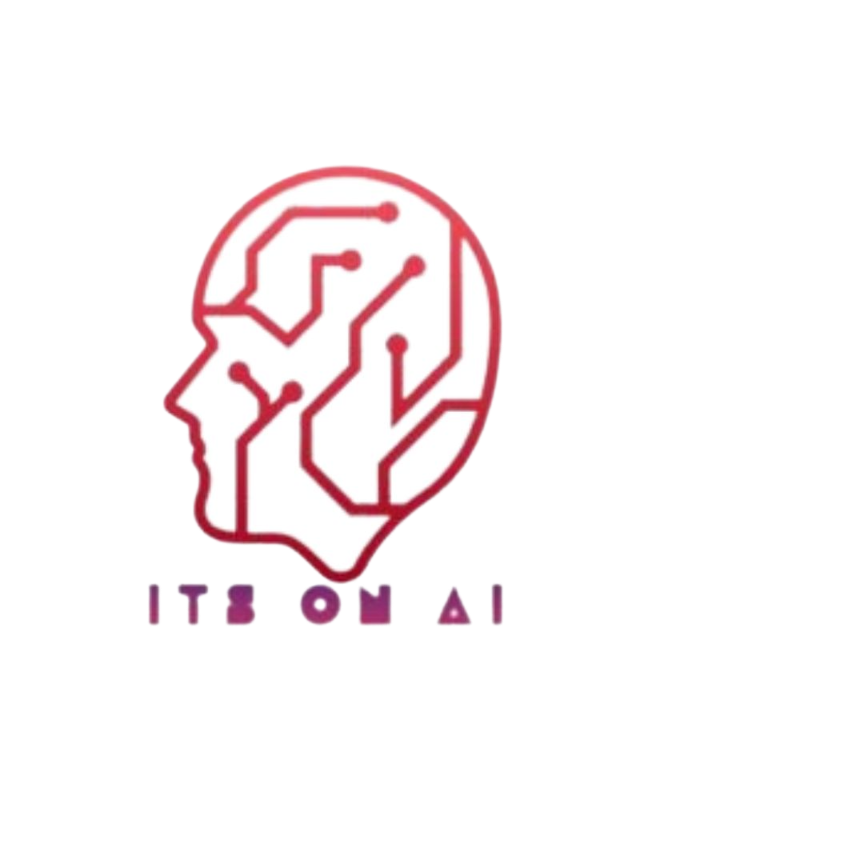Artificial Intelligence: Role of AI in Curing Cancer
Throughout the annals of history, cancer, an insidious and pervasive malady, has cast its ominous shadow over humanity for centuries. Despite the remarkable strides in medical science, the elusive quest for a definitive panacea persists. However, in recent times, the emergence of artificial intelligence (AI) has heralded a formidable tool in the relentless battle against cancer. With its unparalleled capacity to process copious data, discern intricate patterns, and make prescient forecasts, artificial intelligence presents a glimmer of optimism in the war against this formidable foe. This discourse embarks on an exploration of AI’s potential in the realm of cancer research and treatment while delving into the multifaceted challenges and ethical quandaries entailed in harnessing this groundbreaking technological prowess.
Table of Contents
ToggleThe Potency of AI in the Diagnosis of Cancer
 Timely detection stands as a pivotal determinant in the triumph of cancer treatment. AI, endowed with its proficiency to decipher intricate datasets, holds the potential to elevate the domain of cancer diagnosis. The realm of machine learning algorithms boasts the ability to scrutinize medical imagery, including X-rays, MRI scans, and CT scans, with astonishing precision, thereby expediting the early identification of malignant growths.
Timely detection stands as a pivotal determinant in the triumph of cancer treatment. AI, endowed with its proficiency to decipher intricate datasets, holds the potential to elevate the domain of cancer diagnosis. The realm of machine learning algorithms boasts the ability to scrutinize medical imagery, including X-rays, MRI scans, and CT scans, with astonishing precision, thereby expediting the early identification of malignant growths.
By way of illustration, Google’s DeepMind has engineered an AI system, endowed with the capability to analyze mammograms and forecast the emergence of breast cancer with a level of accuracy that rivals the acumen of seasoned radiologists. This progress speeds up the diagnosis and reduces the chances of getting the wrong results in cancer screening, a common problem.
Artificial intelligence isn’t just for looking at X-rays; it also helps analyze slides, genetic info, and medical records to find bad cells and predict how the illness will go. By checking all this data, AI helps doctors make better diagnoses and suggest treatments.
Customized Blueprints for Treatment
Cancer is different for each person, so it’s crucial to create treatment plans that fit their specific type of cancer. AI can change how we treat cancer and help create personalized plans.
With AI, we use individual patient data to predict how their cancer will respond to various treatments. This helps doctors choose the best treatments faster, saving time and reducing the harm of ineffective treatments. AI also helps connect patients with clinical trials that match their unique cancer, providing access to advanced therapies.
Pioneering Drug Discovery and Development
 Discovering and making new medicines takes a long time and costs a lot of money, often billions of dollars over many years. AI helps speed things up by going through huge sets of chemical information and how things work in our bodies. It also looks at results from medical tests to find possible new drugs. Artificial intelligence helps scientists choose which chemicals to work on, making it faster to develop new drugs.
Discovering and making new medicines takes a long time and costs a lot of money, often billions of dollars over many years. AI helps speed things up by going through huge sets of chemical information and how things work in our bodies. It also looks at results from medical tests to find possible new drugs. Artificial intelligence helps scientists choose which chemicals to work on, making it faster to develop new drugs.
AI-powered systems, such as IBM’s Watson for Drug Discovery, are boosting the pharmaceutical industry. They assist in finding new targets and reusing current drugs for treating cancer. AI speeds up drug discovery, making it faster to create better cancer treatments.
Obstacles and Ethical Contemplations
The allure of AI in cancer research and treatment comes with inherent obstacles and ethical considerations that cannot be ignored. The ensuing are some of the cardinal issues demanding attention:
Privacy of Data: The leverage of AI mandates unfettered access to expansive reservoirs of patient data. Safeguarding the sanctity and security of this data emerges as a significant preoccupation. The delicate equilibrium between data dissemination and patient confidentiality stands as a non-negotiable imperative.
 Partiality within Data: The efficacy of AI algorithms hinges on the quality of data underpinning their training. If AI data is biased, it can make unfair decisions in cancer care. We need to fix these biases for fair healthcare. Using varied data is very important.
Partiality within Data: The efficacy of AI algorithms hinges on the quality of data underpinning their training. If AI data is biased, it can make unfair decisions in cancer care. We need to fix these biases for fair healthcare. Using varied data is very important.
Validation and Oversight: AI-infused tools intended for diagnosis and treatment must traverse arduous validation procedures and regulatory scrutiny to attest to their safety and efficacy. This necessitates harmonious synergy between the healthcare sector and regulatory authorities.
Assimilation into Clinical Practice: The integration of artificial intelligence into the warp and weft of clinical workflows, accompanied by the imperative that healthcare professionals harbor trust in and comprehend the machinations of AI systems, stands as a challenging endeavor. Adequate training and education emerge as indomitable prerequisites for the maximization of the benefits rendered by AI.
Patient Self-Governance: Using AI in cancer diagnosis and treatment should not interfere with patients’ independence. The idea of making decisions together between patients and healthcare providers should remain unchanged.
Conclusion
It’s still unclear if artificial intelligence can be the full answer to cancer. However, AI is a strong helper in the fight against this complex disease. AI can change the way we see cancer, from quickly noticing problems to creating custom treatments and speeding up drug findings. This change can be really big. Even with challenges and ethical concerns, we can’t ignore how helpful AI can be in treating cancer. As AI gets better in health, we move closer to better cancer treatment and maybe even getting rid of it.


